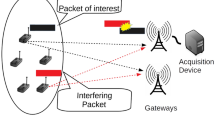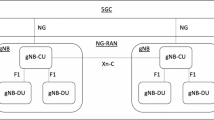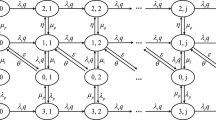Abstract
In this paper, performance of opportunistic scheduling (OS) in wireless multimedia and data networks is studied based on popular stochastic network calculus (SNC). For this purpose, we firstly bound traffic arrival process by using exponentially bounded burstiness (EBB) traffic model of SNC and establish stochastic arrival curve. Then we propose a new wireless opportunistic scheduling-Modified Proportional Fairness (MPF) scheduling algorithm which can provide better fairness for input traffic to guarantee quality of service (QoS) performance and obtain stochastic service curve. Compared with traditional Round-Robin (RR), Greedy (GY) and Proportional Fairness (PF) scheduling algorithms, MPF scheduling algorithm can get better equilibrium between delay and backlog. More specifically, our MPF scheduling algorithm can provide better fairness and QoS by introducing a weighted factor to identify user’s priority. On the other hand, the framework based on SNC also provides higher utilization of network resource and statistical meanings for delay and backlog, so MPF can schedule input traffic effectively as long as the input traffic satisfies some bounded conditions. The numerical results show that our stochastic model and MPF scheduling algorithm can provide better QoS performance.





Similar content being viewed by others
References
3GPP2 C.S0024 Version 4.0 (2002) CDMA 2000 High rate packet data air interface specification
3GPP TS 25.848 (2001) Physical layer aspects of utra high speed downlink packet access. Release 4
Chang CS (1994) Stability, queue length, and delay of deterministic and stochastic queueing networks. IEEE Trans Automat Contr 39(5):913–931
Cruz RL (1991) A calculus for network delay, part I: network elements in isolation. IEEE Trans Inf Theory 37(1):114–131
Cruz RL (1991) A calculus for network delay, part II: network analysis. IEEE Trans Inf Theory 37(1):132–141
Dianati M, Shen X, Naik K (2007) Cooperative fair scheduling for the downlink of CDMA celluar networks. IEEE Trans Veh Technol 56(4):1749–1760
Jiang Y (2006) A basic stochastic network calculus. In: Procs. SIGCOMM, pp 123–134
Kavitha V, Altman E, El-Azouzi R, Sundaresan R (2012) Opportunistic scheduling in cellular systems in the presence of noncooperative mobiles. IEEE Trans Inf Theory 58(3):1757–1773
Li Y (2012) Hybrid opportunistic scheduling in cognitive radio networks. IEEE Trans Wirel Commun 11(1):328–337
Liu Y, Ch Tham K, Jiang YM (2008) A calculus for stochastic QoS analysis. Perform Eval 64(6):547–572
Prakash R, Veeravalli VV (2007) Centralized wireless data networks with user arrivals and depatures. IEEE Trans Inform Theory 53(2):693–713
Shakkottai S (2008) Effective capacity and QoS for wireless scheduling. IEEE Trans Automat Contr 53(3):749–761
Starobinski D, Sidi M (2000) Stochastically bounded burstiness for communication networks. IEEE Trans Inf Theory 46(1):206–212
Wang GC, Lai MX, Huang F, Li TSh (2010) A stochastic network calculus for service performance in wireless mesh networks. In: Procs. of ICCSE 2010, pp 1685–1688
Wang GC, Wang N, Lai MX (2012) An end-to-end delay based on stochastic network calculus in wireless mesh networks. Lect Notes Electr Eng 143(1):235–242
Yaron Q, Sidi M (1993) Performance and stability of communication networks via robust exponential bounds. IEEE/ACM Trans Netw 1(3):372–385
ZZBoorstyn RR, Burchard A, Liebeherr J, Oottamakorn C (2000) Statistical service assurances for traffic scheduling algorithms. IEEE J Sel Areas Commun 18(12):2651–2664
Acknowledgements
The authors would like to thank the anonymous reviewers for the careful reading of the original manuscript. Their comments and suggestions have led to a much better presentation of the paper. This research is supported in part by the National Natural Science Foundation of China under Grant Nos. 61063045, 61262003 and 61103245, in part by the Natural Science Foundation of Guangxi Province under Grant No.2010GXNSFC013013.
Author information
Authors and Affiliations
Corresponding author
Rights and permissions
About this article
Cite this article
Wang, G., Wang, N., Yu, X. et al. Performance analysis of opportunistic scheduling in wireless multimedia and data networks using stochastic network calculus. Multimed Tools Appl 74, 25–41 (2015). https://doi.org/10.1007/s11042-013-1448-2
Published:
Issue Date:
DOI: https://doi.org/10.1007/s11042-013-1448-2




